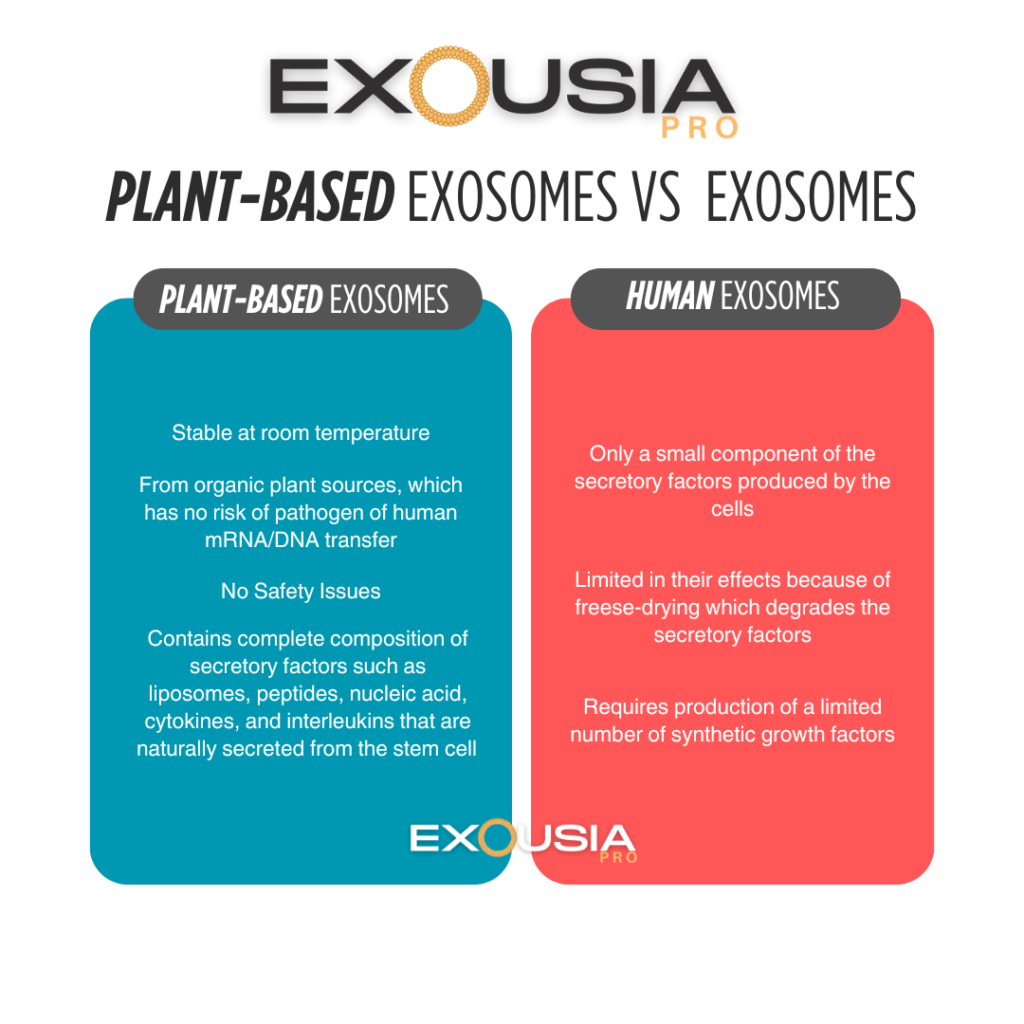“We are revolutionizing the potential of plant-derived exosomes as a botanical substitute for human exosomes“
Exosomes: From the Beginning
Exosomes were first discovered in the 1980s, when researchers initially observed small vesicles being secreted by cells. These vesicles were believed to be cellular debris or byproducts of cell turnover. The breakthrough came in 1983, when two independent studies—one by John Raposo and colleagues and another by Peter Harding and his team—revealed that exosomes were not just cellular waste, but functional entities with important roles in intercellular communication. The researchers identified exosomes as small, membrane-bound vesicles ranging from 30 to 150 nanometers in diameter, released from multivesicular bodies (MVBs) into the extracellular space. These discoveries challenged earlier assumptions and opened the door to understanding exosomes as key players in various biological processes, including immune response, cell signaling, and disease progression. As the field advanced, it became clear that exosomes contained proteins, lipids, and RNA, positioning them as crucial vehicles for cell-to-cell communication and potential therapeutic applications.
Exosomes: The FedEx of Cells
Exosomes are often likened to couriers because they act as delivery vehicles, transporting various molecular cargo, such as proteins, lipids, and RNA, between cells. Just as a courier picks up and delivers packages from one location to another, exosomes carry their cargo from one cell to another, facilitating communication between distant cells. This “delivery” allows exosomes to transfer information that can influence the behavior of recipient cells, such as triggering immune responses, regulating gene expression, or even contributing to disease processes like cancer metastasis. The ability of exosomes to travel through bodily fluids like blood, saliva, and urine, delivering their cargo to specific target cells, underscores their role as highly efficient biological couriers, enabling complex signaling networks within the body.

Plant-Based Exosomes
Plant-based exosomes, also known as plant-derived exosomes or extracellular vesicles (EVs), are similar to the exosomes found in animal cells, but they are secreted by plant cells. These vesicles are small, membrane-bound structures that carry various molecular cargo, such as proteins, lipids, RNA, and other biomolecules. Just like animal exosomes, plant-derived exosomes are involved in intercellular communication, though their functions and mechanisms are still being actively researched.
What distinguishes plant-based exosomes from animal-derived ones is that they are naturally produced by plants and can be isolated from plant tissues, fruits, seeds, and even plant-based foods. They have gained attention for their potential use in food science, nutrition, and biomedicine due to their bioactive components and potential health benefits.
Key features and potential applications of plant-based exosomes include:
- Health Benefits: Plant exosomes are believed to carry bioactive compounds like small RNAs, proteins, and polyphenols, which can have antioxidant, anti-inflammatory, and anticancer properties. There is increasing interest in using these vesicles as nutraceuticals—biologically active food ingredients that promote health and prevent disease.
- Drug Delivery: Plant-derived exosomes are also being explored for their potential to serve as drug delivery systems. They have natural properties that may make them less likely to trigger immune responses compared to synthetic or animal-derived vesicles, offering a potential advantage in clinical applications.
- Environmental and Eco-Friendly: Unlike animal-derived exosomes, which can raise ethical and environmental concerns, plant-based exosomes are considered more sustainable and environmentally friendly. They can be isolated from plants that are grown in abundance, making them a renewable resource for various applications.
- Viral Immunity and Disease Management: Some research has suggested that plant exosomes may play a role in plant immunity, helping plants resist infections by transporting defensive molecules. This has led to interest in using plant exosomes in immunotherapy for humans, particularly as a way to modulate immune responses in diseases like cancer.
What Makes Plant-Based Exosomes so Exciting?
Plant-Based exosomes will allow us to load these cell couriers with thousands of biomimetic factors, including growth factors, peptides, liposomes, amino acids, and proteins directed explicitly to target inflammation as well as for wound healing angiogenesis and the stimulation of hyaluronic acid, collagen and elastin production.
Furthermore, Plant-based exosomes can be engineered to carry drugs, proteins, or RNA molecules to specific tissues or cells, making them highly promising for targeted drug delivery systems. Exosomes are naturally adept at fusing with cell membranes, which allows them to efficiently deliver their cargo directly to the inside of recipient cells. This makes them ideal for delivering therapeutic agents to targeted locations in the body, minimizing side effects compared to conventional drugs.

ExousiaPRO & The Future of Plant-Based Exosomes
The future of plant-based exosomes is promising, with growing interest in their potential to revolutionize fields like medicine, agriculture, and food science. As research into their properties and applications expands, we are likely to see significant advances in both their use as therapeutic tools and their integration into various industries. Here are some key areas where plant-based exosomes could make a major impact in the future:
1. Drug Delivery and Targeted Therapy
One of the most exciting possibilities for plant-based exosomes is their use in targeted drug delivery. Due to their natural ability to carry bioactive molecules (proteins, lipids, RNAs) across cellular membranes, plant exosomes could be engineered to deliver therapeutic drugs, gene therapies, or even vaccines directly to specific cells or tissues. This targeted delivery could help minimize side effects and enhance the effectiveness of treatments for conditions such as cancer, autoimmune diseases, and neurodegenerative disorders.
Future Impact: Researchers are working on optimizing plant exosomes as delivery systems for chemotherapeutic agents, RNA-based therapies (like siRNA or mRNA), and immune modulators, which could offer a safer and more efficient alternative to traditional delivery methods.
2. Immunotherapy and Vaccine Development
Plant exosomes have shown promise in immunotherapy, particularly in their potential to modulate immune responses. Because exosomes can carry and deliver immune-stimulating molecules, they might be used to enhance the immune system’s ability to recognize and attack cancer cells or pathogens. Additionally, plant exosomes are being explored for their potential in vaccine delivery, where they could deliver antigens to stimulate a protective immune response without the risk of disease transmission from animal-based products.
Future Impact: Plant exosome-based vaccines and immune therapies could become an affordable, scalable, and safer alternative to current vaccine technologies, with fewer concerns about contamination from animal pathogens.
3. Nutraceuticals and Food Supplements
Plant exosomes are thought to carry bioactive molecules, such as polyphenols, flavonoids, and small RNAs, that have health-promoting effects. These exosomes could be used as nutraceuticals—natural food-based substances that offer health benefits beyond basic nutrition. Since exosomes can protect and deliver their bioactive cargo more effectively than simple nutrients, plant-based exosomes could enhance the bioavailability of nutrients and therapeutic compounds.
Future Impact: We may see the development of new, plant-derived functional foods or supplements, including exosome-enriched products that help in preventing chronic diseases, reducing inflammation, or improving gut health. These products could be more effective and easier to absorb than current supplements.
4. Gene Therapy and RNA Delivery
Plant exosomes can naturally carry and transport small RNA molecules, including miRNA (microRNA) and siRNA (small interfering RNA). These RNA molecules have the potential to regulate gene expression and are of great interest for gene therapy. By using plant exosomes to deliver RNA to target cells, it may be possible to manipulate gene expression in a controlled way for therapeutic purposes.
Future Impact: In the future, plant exosomes could be engineered to deliver RNA therapies for genetic disorders (e.g., cystic fibrosis, muscular dystrophy) and other conditions where gene silencing or activation is needed. This could be a more natural and efficient delivery system compared to viral vectors currently used in gene therapy.
5. Cancer Diagnosis and Treatment
Exosomes, in general, are involved in cell-to-cell communication and can carry molecules that reflect the condition of their originating cells. Plant-based exosomes, due to their biocompatibility and lack of toxicity, could be engineered for use in cancer diagnostics and therapeutics. They might be used to carry tumor-associated antigens or RNA-based treatments that could target and destroy cancer cells.
Future Impact: Plant exosome-based diagnostics could be developed as non-invasive tests for detecting cancer or monitoring treatment response. Additionally, they could play a role in targeting specific cancer cells, improving the precision of cancer therapies while reducing damage to healthy tissue.
6. Cosmetic and Skin Care Applications
Due to their ability to deliver bioactive compounds and proteins, plant-based exosomes are being explored for use in cosmetics and skin care products. These exosomes could be used to deliver anti-aging compounds, moisturizing agents, and other beneficial ingredients directly to skin cells, improving the effectiveness of skin treatments.
Future Impact: Plant exosomes could revolutionize the cosmetic industry by creating new anti-aging formulations, wound healing products, and skin regeneration therapies. Exosome-based cosmetics could be more effective than current formulations, with fewer side effects.
7. Environmental and Agricultural Benefits
Plant exosomes are involved in plant immunity and are being studied for their potential role in plant defense against pathogens. In agriculture, plant-based exosomes could be used as natural pesticides or plant growth regulators to enhance crop protection without the need for synthetic chemicals.
Future Impact: Plant exosomes could be used in agriculture to create sustainable and eco-friendly pest control, enhanced crop resistance to diseases, and even improved plant growth. This could help reduce reliance on harmful chemicals and contribute to more sustainable farming practices.
8. Cost-Effective and Scalable Production
One of the key advantages of plant-based exosomes is the ease of scalable production. Unlike animal or synthetic-based exosome systems, plants can be grown in large quantities, making it possible to produce exosomes at a lower cost. This scalability could facilitate their use in a wide range of commercial applications.
Future Impact: Plant-based exosomes could be mass-produced for therapeutic, industrial, and agricultural uses, leading to the creation of affordable and accessible treatments in areas like gene therapy, drug delivery, and disease prevention.
Conclusion:
The future of plant-based exosomes is rich with potential. As technology advances, plant exosomes could become a cornerstone of green biotechnology, offering sustainable, efficient, and biocompatible solutions across medicine, agriculture, food science, and beyond. Their natural properties, combined with ongoing research and technological developments, make them an exciting frontier in therapeutic delivery, disease prevention, and environmental sustainability.

